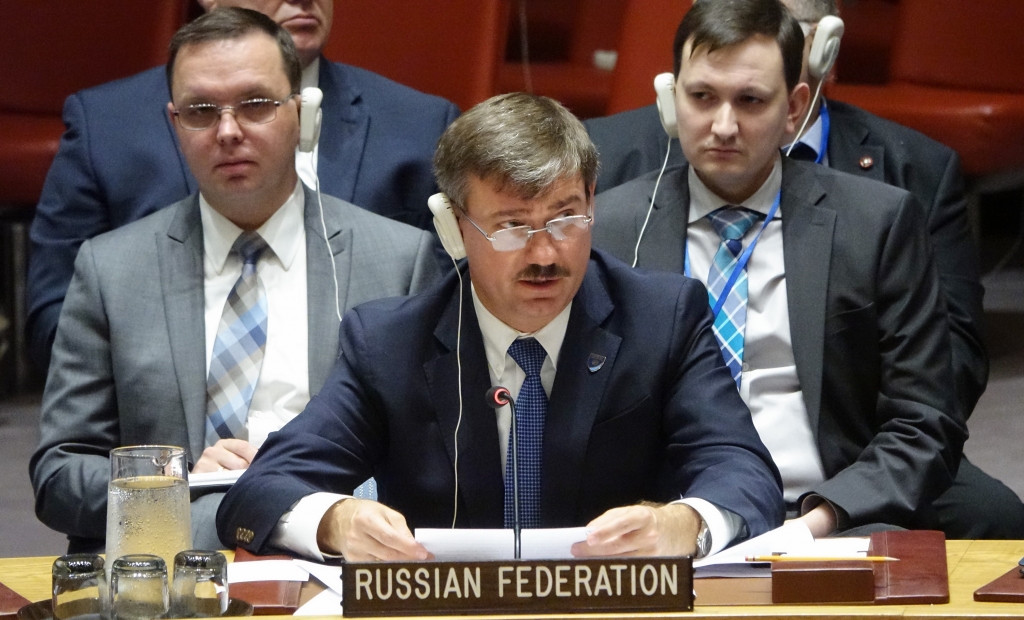Statement by Mr.Petr Illiichev, First Deputy Permanent Representative of the Russian Federation to the United Nations, at the Security Council on United Nations peacekeeping operations (Police Commissioners)
I would like to thank you, Mr. President, for convening today’s meeting on police issues in United Nations peacekeeping operations and special political missions.
We are grateful to Under-Secretary-General Lacroix and the Police Commissioners of the United Nations missions in Mali, Haiti and Darfur, for their helpful briefings. We take this opportunity to once again express our gratitude to all United Nations police peacekeepers for their selfless efforts.
The work of the United Nations police in our current peacekeeping initiatives is extremely important. They deal with tremendous challenges and have to work in increasingly difficult conditions. Besides helping to ensure public order, they also support national Governments in their efforts to protect civilians and play an important auxiliary role in post-conflict reform of law-enforcement institutions and national capacitybuilding for host States.
We believe that because they are providing that assistance on behalf of the entire international community, the police, like peacekeepers, are obliged to comply scrupulously with Security Council mandates, the Charter of the United Nations and the core principles of peacekeeping.
A key part of effective mandate fulfilment is the establishment of constructive, trusting relations with the host State that take its priorities into account. It is the principle of national ownership that guarantees success. One can hardly call it effective international support if a mission’s protracted presence ultimately results merely in substituting the efforts of United Nations police for those of the local force. In providing assistance to States it is equally critical to take national specifics into consideration. Attempts to apply a universal approach to reforming an area as important and sensitive as a society’s law-enforcement structures inevitably ends in the proposed solutions being rejected.
In order to help peacekeepers deal effectively with the challenges they face, especially when additional factors complicate conflicts further, they must get the technical and staffing support they need. The Russian Federation, as a police-contributing country, has continued to expand its contribution to United Nations peacekeeping activities and to deploy personnel with relevant skills.
Since 1992, more than 500 officers from branches of Russia’s Ministry of the Interior have become United Nations police officers. Since the United Nations Chiefs of Police Summit in June 2016, the number of Russian United Nations police officers has increased by more than 50 per cent. They are currently engaged in operations in South Sudan, Kosovo, Haiti and Cyprus, and 20 per cent of them are women. Women’s participation in policing in Russia itself is also growing steadily.
Russia has also been striving to do its bit to improve the effectiveness of police peacekeepers’ work, including that of non-Russian police. Since 2000, the United Nations-certified peacekeeping training centre of the Interior Ministry’s All-Russian Institute for Advanced Training in Domodedovo, near Moscow, has trained more than 350 foreign police peacekeepers, including commanders from more than 50 countries. Russia has unique experience in vocational training for peacekeepers and we are ready to share it.
Russia supported the Council’s adoption today of resolution 2382 (2017). However, we have to point out that the work on the draft resolution was extremely difficult. The Security Council took great pains to ensure that the document did not politicize the work of the United Nations police and that it focused on concrete issues, based on the premise that every element of the United Nations system is responsible for a clearly defined area of issues.
We believe it is unacceptable to put a subjective interpretation on the norms of international humanitarian law, particularly where the protection of civilians is concerned. Under no circumstances should peacekeepers, including police, become a party to a conflict or take any side, and they should certainly not be put in a position of using force against a host State.
The police unquestionably play an important role in United Nations efforts to prevent relapses into conflict within the framework of their mandates in each individual mission, but it is difficult to conceive what their potential contribution could be to the SecretaryGeneral’s prevention and mediation efforts before conflicts break out and missions are deployed. We support the importance of ensuring an ongoing dialogue between the Security Council and troop-contributing countries on every aspect of peacekeeping operations, including mandate planning and formulation.
We believe firmly that discussions on the most difficult issues, particularly police organizational issues, should be transparent, and that the most suitable platforms for them are the existing Working Group on Peacekeeping Operations and the General Assembly’s Special Committee on Peacekeeping Operations, on the latter of which all troop-contributing countries are represented. No external reviews can supplant intergovernmental discussions of police issues. In that context, we welcome the forthcoming briefing by heads of police components to be held in the Special Committee on Peacekeeping Operations.
